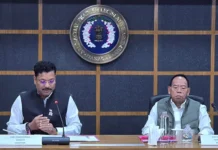[ S Mundayoor ]
Arunachal has just got itself a new elected government, just as we are yet to recover from our annual outpourings over our students’ poor CBSE performances. And hence the announcement of the new draft Education Policy 2019 by the union government has come as a strong beam of hope for all educationists, planners and the common people in the state.
The Dr Kasturirangan Committee report stresses and repeatedly calls for a single-minded onslaught to raise the levels of functional literacy among Indian school students. This, then, gives our new government an excellent opportunity to declare a war on our poor learning standards. It’s the right time for launching a reading mission in our state.
Let us focus on what the new education policy says about the poor literacy skills among school students. The report is quite forthright and points to the decades-long and acute neglect of primary school education in respect of basic literacy and numeracy, and how it has led to the present gloomy status of low educational achievements among a large section of the common people of India.
In the elaborate Chapter 2, ‘Foundational literacy & numeracy’, the report reminds us of the current status of school education in India: “At the current time, there is a severe learning crisis in India, where children are enrolled in primary schools but are failing to attain even basic skills such as foundational literacy and numeracy…. Schooling in the early years also lays too little curricular emphasis on foundation literacy, and in general, on the reading, writing and speaking of languages (the emphasis is the writer’s).”
Not many would disagree that the above description could well fit the school scenario in Arunachal. Our literacy rate may be above 70% – better than many other states on paper – but with no mother tongue as our official language and English as our state language, it hardly holds forth a bright future as a reading-empowered society.
The report continues: “It is imperative to address this crisis head on…. If action is not taken soon, over the next few years the country could lose 10 crore or more students – the size of a large country – from the learning system and to illiteracy.”
Hence the new education policy declares one of its major objectives as: “By 2025, every student in Grade 5 should attain foundation literacy”… and explains why: “If students are given solid foundation in reading writing and speaking…, in being creative, then all other future lifelong learning will become that much easier, faster and more enjoyable.”
To the great happiness of booklovers and library volunteers in Arunachal, the policy also highlights the significance of library access and use by students, and, more important, the teachers. Under the title ‘Expansion of public and school libraries and building a culture of reading and communication’ (P 2.15), it says: “To create a culture of reading, public and school libraries will be expanded across the country, and will contain books – particularly children’s books – in local and regional languages. Schools and school complexes will also have a large selection of books in local languages, and teachers will actively encourage children to take books home to read. Students will be asked to read excerpts from their favourite books/stories… to encourage reading as well as develop communication skills.”
It provides simple, lucid suggestions to schools on how to promote the reading habit: “Weekly activities around the library, storytelling, theatres, group reading, writing and display of original writings by children….”
The policy thus projects a library not as a physical storehouse of books with cupboards and locks but as a living, dynamic institution that allows young readers to interact with books in productive and joyful learning activities – a major, purposeful departure from their present status in most institutions.
It may be mentioned here that the tiny units of the Lohit Youth Library Network across Anjaw, Lohit, Namsai and Lower Dibang Valley districts have been promoting precisely these activities during the last 12 years in their ‘Joy of reading’ campaigns across the government schools of this region. Many are young Arunachalees whose lives and destinies have undergone a marked change because of their taking to reading. Others have felt the burdens and anxieties of their schooling becoming much lighter, by their association with a library and books.
Fortunately, the library network, since its inception, has been receiving generous patronage of the district administration and the education departments of these districts, which made it possible for the network to strive to encourage the reading habit among the youths in marginalized and remote pockets.
Yet the policy clearly reminds all of us in Arunachal that it is not the time to sit and relax, leaving it to a few volunteers, activists and patrons to contribute to build a reading Arunachalee society. What little has been done may be good, but we have miles to go before we can pat ourselves on the backs.
Students in hundreds of schools, both in towns and villages, need support from the educated elite to develop their functional literacy and build a taste for reading, outside their textbooks. Hundreds of teachers need to be convinced that they can build a reading Arunachalee society only if the schools have accessible mini-libraries with reader-friendly books. Thousands of parents and ordinary citizens can support the reading culture in their homes, only if there are reading rooms in their localities and they find children coming home with enjoyable books, and the local teachers and literate adults visit these reading rooms. And several thousand neo-literates need enjoyable books in their own mother tongues, if we wish to see them transform into empowered readers.
The time is ripe for a spirited mission mode thrust like the Pulse polio campaign. An enlightened government would surely find resources to restart school libraries, which mysteriously vanished during the ’80s and the ’90s. Community organisations and NGOs in Arunachal could come forward to run libraries and reading rooms in locations where government libraries don’t exist. Hundreds of educated Arunachalee youths and officials need to volunteer to spare an hour a week or a few in a month to help reading deprived children, youths and neo-literates. The report confirms our convictions: “If every literate member of the community could commit to teaching one student/person how to read, it could change the country’s landscape very quickly.”
All these, no doubt, seem like a tall order, but are not impossible. If our leaders and educated elite feel an urge to work together to build a reading Arunachalee society in the next 10 years, they could produce a galvanizing effect on the people.
The new education policy wisely advises the stakeholders to “evolve strategies and programmatic interventions” to achieve these objectives, keeping in view the circumstances and the socio-cultural background of each state. This freedom and flexibility of action by the state governments to develop area- and community-specific strategies is something Arunachal should fully utilize to build a vibrant reading society. This is what we owe to our coming generations. [The writer is an educational activist with nearly four decades of close association with Arunachalee youths. He is also the coordinator of the Lohit Youth Library Network. He can be reached at: lohit.libraries@gmail.com]


